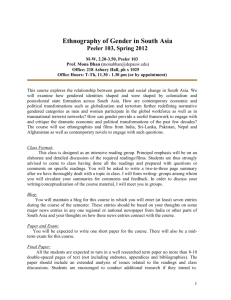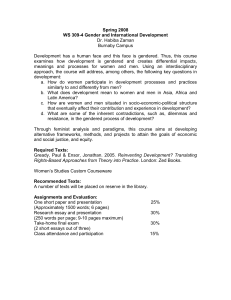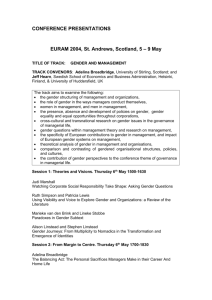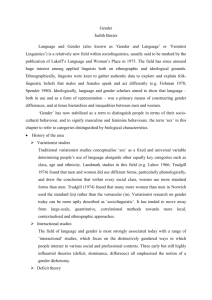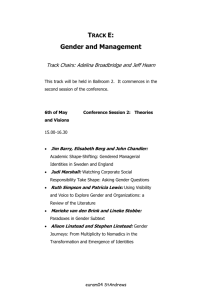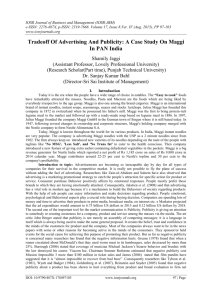Anth 290A Ethnography of Gender - Bhan
advertisement
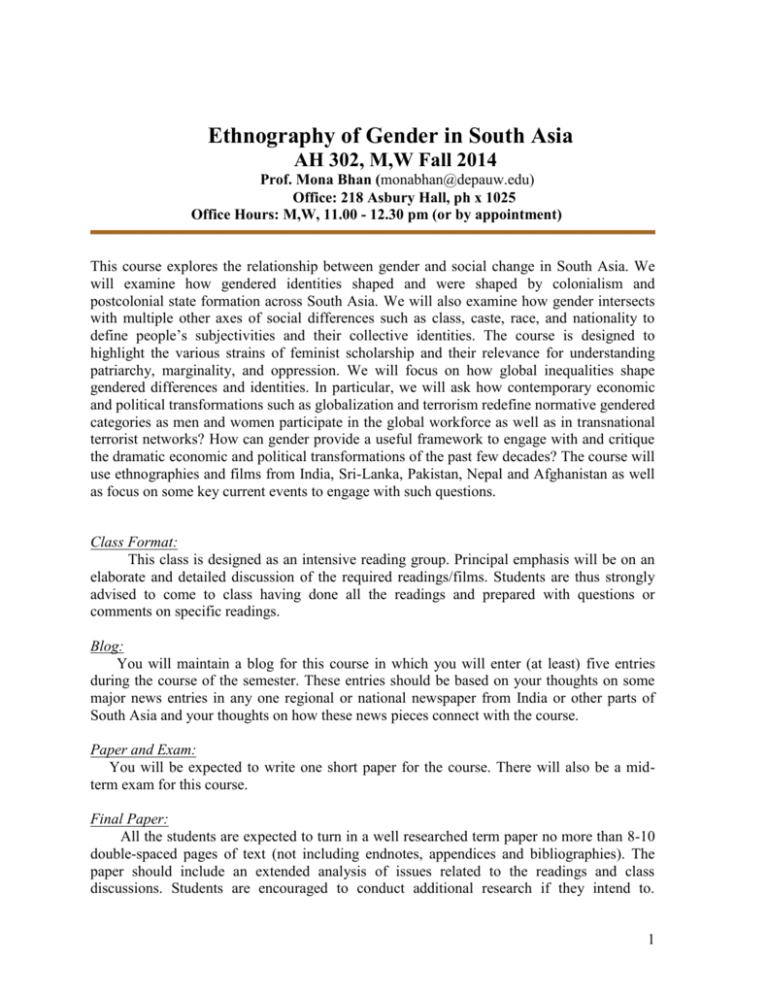
Ethnography of Gender in South Asia AH 302, M,W Fall 2014 Prof. Mona Bhan (monabhan@depauw.edu) Office: 218 Asbury Hall, ph x 1025 Office Hours: M,W, 11.00 - 12.30 pm (or by appointment) This course explores the relationship between gender and social change in South Asia. We will examine how gendered identities shaped and were shaped by colonialism and postcolonial state formation across South Asia. We will also examine how gender intersects with multiple other axes of social differences such as class, caste, race, and nationality to define people’s subjectivities and their collective identities. The course is designed to highlight the various strains of feminist scholarship and their relevance for understanding patriarchy, marginality, and oppression. We will focus on how global inequalities shape gendered differences and identities. In particular, we will ask how contemporary economic and political transformations such as globalization and terrorism redefine normative gendered categories as men and women participate in the global workforce as well as in transnational terrorist networks? How can gender provide a useful framework to engage with and critique the dramatic economic and political transformations of the past few decades? The course will use ethnographies and films from India, Sri-Lanka, Pakistan, Nepal and Afghanistan as well as focus on some key current events to engage with such questions. Class Format: This class is designed as an intensive reading group. Principal emphasis will be on an elaborate and detailed discussion of the required readings/films. Students are thus strongly advised to come to class having done all the readings and prepared with questions or comments on specific readings. Blog: You will maintain a blog for this course in which you will enter (at least) five entries during the course of the semester. These entries should be based on your thoughts on some major news entries in any one regional or national newspaper from India or other parts of South Asia and your thoughts on how these news pieces connect with the course. Paper and Exam: You will be expected to write one short paper for the course. There will also be a midterm exam for this course. Final Paper: All the students are expected to turn in a well researched term paper no more than 8-10 double-spaced pages of text (not including endnotes, appendices and bibliographies). The paper should include an extended analysis of issues related to the readings and class discussions. Students are encouraged to conduct additional research if they intend to. 1 Students will be expected to submit their paper abstract a month before it is due in order to get sufficient feedback from the instructor. For the written assignments, students will be graded on the quality of writing (construction of arguments, integration of course material and ideas, grammar, formatting etc.) The overall grading system will be: Participation: 15% (Discussion, Attendance) Blog: 5% Short Paper: 25% Mid-term exam: 20% Final Presentation: 10% Research Paper : 25% Required Texts 1. Shalini, Shankar, 2008. Desi Land: Teen Culture, Class, and Success in Silicon Valley. Durham: Duke University Press 2. Maggi, Wynne. 2001. Our Women are Free: Gender and Ethnicity in the Hindukush. Ann Arbor: University of Michigan Press. 3. Trawick, Margaret. 2007. Enemy Lines; Childhood, Warfare and Play in Batticaloa. University of California Press. 4. Gamburd, M. 2000. The Kitchen Spoon's Handle: Transnationalism and Sri Lanka's Migrant Housemaids. Ithaca: Cornell University Press Topics I. W, 8/27 Is Women’s Subordination Universal? Debates Within The Field Introduction M, 9/1 Ortner, S. “Is Female to Male as Nature Is to Culture?” W, 9/3 Ortner, S. “So, Is Female to Male as Nature is to Culture? Nussbaum, M. “Women and Cultural Universals” 2 11. Sisterhood or Solidarity: What’s the Difference? M, 9/8 Mohanty, C. “Feminism without Borders: Decolonizing Theory, Practicing Solidarity. pp. 1 - 42 W, 9/10 Jagger, A. “Saving Amina: Global justice for Women and Intercultural Dialogue” and the Times article on Women in Afghanistan http://www.time.com/time/world/article/0,8599,2007238,00.html http://www.youtube.com/watch?v=C97mh-ZnaGs AFGHAN WOMEN: A HISTORY OF STRUGGLE - PART 9/ Watch The Kabul Beauty School M, 9/15 Bose, Purnima. “From Humanitarian Mission to Beautifying Mission.” http://www.genders.org/g51/g51_bose.html W, 9/17 Lila Abu-Lughod. “Do Muslim Women Really Need Saving? Anthropological Reflections on Cultural Relativism and its Others.” Leila Ahmed, ‘Western Ethnocentrism and Perceptions of the Harem,’ Feminist Studies 8 (Fall 1982) 111. Gendered Colonial/ National Encounters: History, Politics, Culture M, 9/22 Stoler, A. “Carnal Knowledge and Imperial power” Ortner, S. “Borderland Politics and Erotics” http://www.youtube.com/watch?v=RNqRwOOTB50 W, 9/24 Das, V. “National Honor and Practical Kinship: Of Unwanted Women and Children” M, 9/29 When Bodies Are Not Equal. How Can Rights be Equal? Das, Veena. “Strange Response” Mani, L. Contentious Traditions Narayan, U. “Restoring History and Politics to Third World Traditions” Kumar, Radha. “The History of Doing” 3 IV. Gender, Power, and Agency/ Moving beyond victimization W, 10/1 Hegland, Mary E. M, 10/6 Maggi, W. “Our Women are Free; Gender and Ethnicity in the Hindukush” W, 10/8 Maggi, W. “Our Women are Free; Gender and Ethnicity in the Hindukush” V. Women, Outsourcing, Migration M, 10/13 Pande, A, ‘Commercial Surrogacy in India: Manufacturing a Perfect Mother Worker.’ W, 10/15 (Films) Diverted to Delhi and Made in India (Conference) M, 10/27 Gamburd, M, “ The Kitchen Spoon’s Handle.” W, 10/29 Gamburd, M, “ The Kitchen Spoon’s Handle.” VI. Modernity, Consumption, and Globalization M, 11/ 3 William Mazzarella, 2001. “Citizens have Sex, consumers make love: Marketing Kamasutra condoms in Bombay. W, 11/5 Russell, Andrew.1997. “Miss World Comes to India” Jones, G. Blonde and Blue-Eyed? The Globalization of the Beauty Industry 1945-1980 Radhika Parameswaran, 2004. “Global queens, national celebrities: tales of feminine triumph in post-liberalization India” M, 11/10 (FILM) The World Before Her. Read after watching the film: https://in.news.yahoo.com/the-strangely-narrow-world-before-her-073623262.html 4 V1. Diasporic Identities W, 11/12 Shalini S. “Desi Land” M, 11/17 Shalini S. “Desi Land” VII. Gender and Terrorism W, 11/19 Enemy Lines M, 11/24 Cont…. W, 12/26 Haq, F. Militarism and Motherhood: The Women of the Lashkar-i- Tayyabia in Pakistan M, 12/1 Presentations W, 12/3 Presentations M, 12/8 Presentations 5 Instructions for your final paper for this class: For your final research papers pick any topic that deals with any aspect of gender in South Asia. You must use at least five to six outside scholarly resources to frame your argument. I would suggest using at least two sources from the course. In all, there must be a minimum of seven sources in your bibliography. Pick a researchable problem. Anything to do with nationalism, representations, Third World Feminism, First World feminism, gendered orientalism, globalization, colonialism, consumption, diasporic identities, terrorism etc. Feel free to choose your own area of interest. Try to formulate what your research question might be (this also applies to your presentation in class). Why are you interested in this question? How does it relate to our discussions in class? What are some of the national and international debates around the issue you choose to focus on? I would strongly recommend that in order to narrow down your research question, you pick two concepts rather than focus on one. For instance, there is so much material on consumption that it will be hard for you to formulate a research problem if you focused solely on consumption. Pick a lens (gender, class, beauty etc.) to illuminate your specific interventions in the literature. Same is the case with colonialism (gender and colonialism, representations and colonialism etc.) How does South Asia in particular illuminate some of your questions? What are the wider theoretical debates around these issues? How does your paper contribute to or extend these debates. Length of the paper: not more than 10 pages and not less than 8 pages, double spaced. 6
